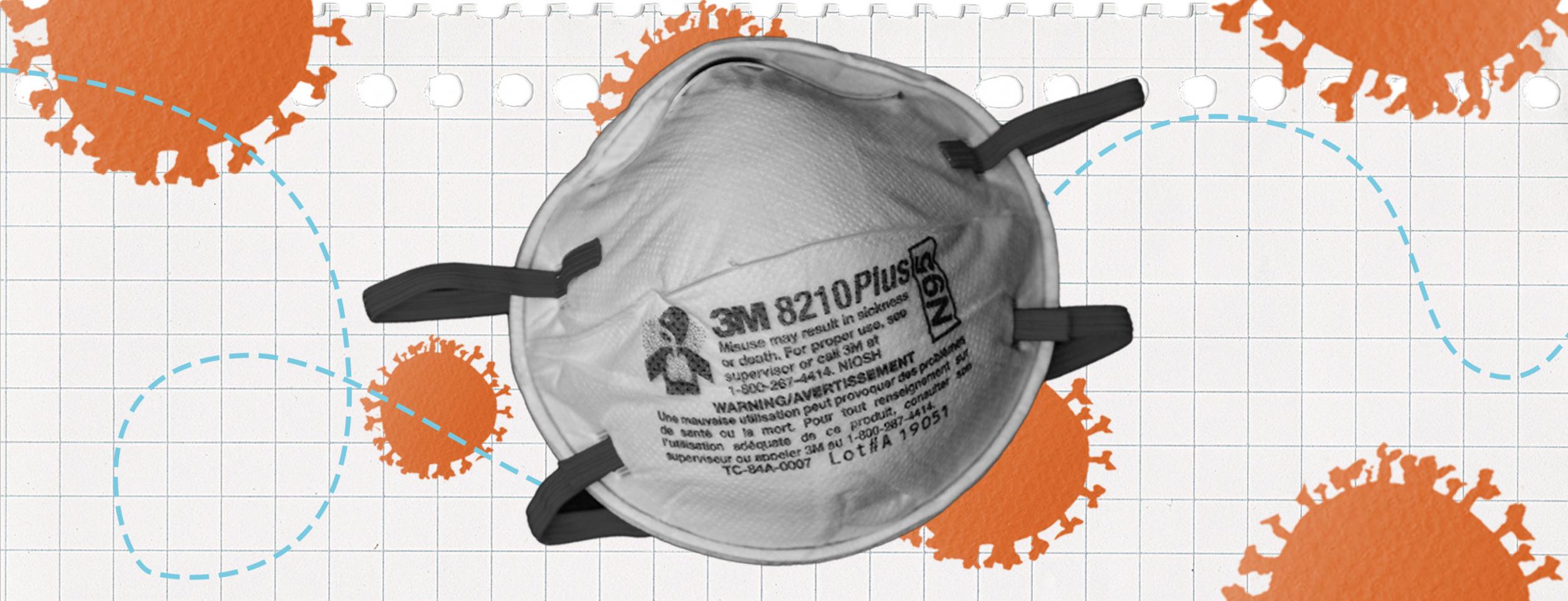
This is part one of a four-part series on how access to justice build resilience in the Sahel. Read the introduction here.
Sometime in February, in another world, I purchased masks.
Knowing little about respiratory protection, I had to learn the jargon. What is the difference between a dust mask and a particulate respirator? Did I really need a pricey Niosh-rated model, or would a simple face covering suffice? I wanted something reasonably effective without appearing to have prepped for doomsday. After all, I would be wearing these masks for many hours, in busy airports and public spaces on three different continents. I wanted to avoid the stereotype of a paranoid American.
In retrospect, my purchase — two respirators intended for the abatement of household lead and mold — now feels extravagant. Had I understood the vital significance that terms like N-95 and PPE would soon assume in the fight against COVID-19, I would have reserved such precious equipment for healthcare workers and first responders who are directly handling infectious patients. At the time, however, it was unimaginable that someone could need them more. Indeed, many features of our current crisis would remain implausible until the middle of March, when the World Health Organization finally declared a global pandemic, and global systems of production and exchange slowed to a halt.
As I left the country on March 11, I had fragility in mind. I was heading to one of the world's hot spots for state failure, the West African Sahel, in order to conduct field interviews for the World Justice Project's Rule of Law Solutions Initiative. The region has received significant international attention as the site of a major Ebola outbreak in 2014–2016. For most of the past decade, however, it has also been host to a different sort of pandemic, equally deadly though less widely reported, of violent extremism. A restive new front in the global war on terror, the Sahel is now in the grip of a regional conflict between fragile states and terror groups of many stripes. The latter include transnational jihadist networks such as al-Qaeda in the Islamic Maghreb (AQIM) and Jama'at Nasr al-Islam wal Muslimin (JNIM), as well as various smaller jihadist organizations. The situation is further complicated by local factions seeking to leverage the crisis.1
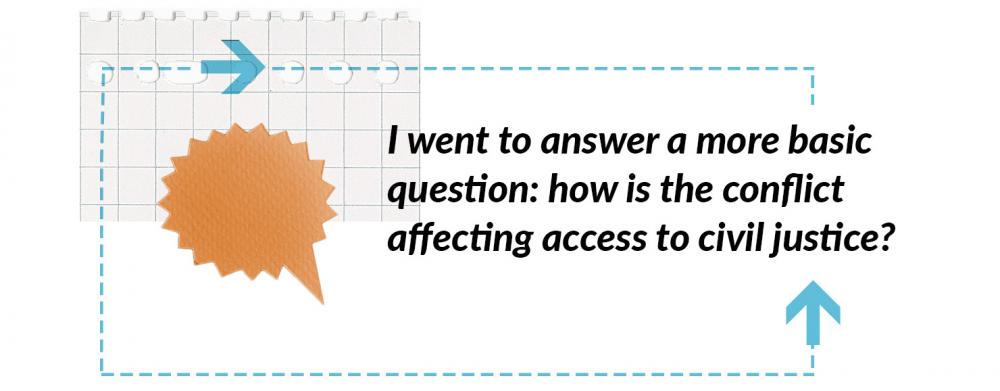
I did not go to assess the progress of war, however. At least not directly. I went to answer a more basic question: how is the conflict affecting access to civil justice? As the government has withdrawn from vast swathes of territory, how are ordinary Malians resolving their disputes over land and resources? To whom do they turn when someone fails to pay a debt or honor the terms of a contract? To register birth and death, marriage and divorce?
Conversely, I wanted to understand how weak justice systems have contributed to the region's ongoing security crisis — and whether justice programs are helping to resolve the many local disputes now fueling the broader conflict. Could efforts to provide legal identity, for example, help the thousands of people across the region who toil in conditions of slavery? Could emancipation lead to peace?
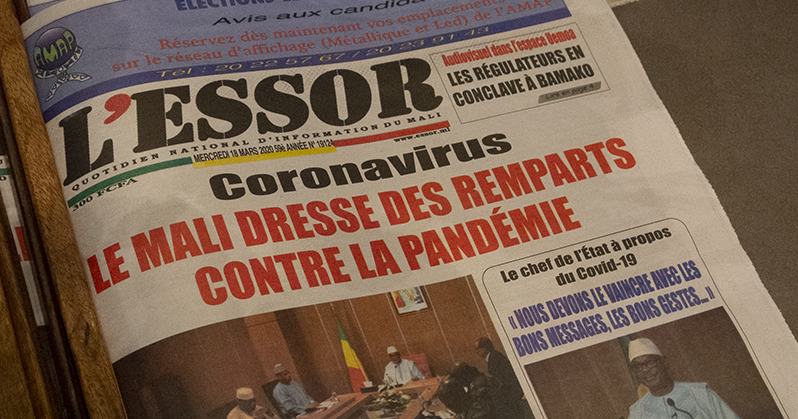
The World Justice Project (WJP) defines access to justice as the ability of people to meet their legal needs without undue hardship. This concept entails the ability to obtain justice for civil, administrative, or criminal justice problems; inclusion in the opportunities the law provides, including legal identity, housing or land tenure, and formal work arrangements; and freedom from extreme conditions of injustice, such as statelessness, modern slavery, and high levels of insecurity. In a landmark report, WJP estimated that 5.1 billion people worldwide lack access to justice in one or more of these categories.
This global justice gap affects rich and poor countries alike. However, WJP had identified the Western Sahel as a hotspot for unmet civil justice needs in a special report comparing legal needs and access to civil justice across 101 countries worldwide. With the notable exceptions of Senegal and Burkina Faso, West African countries also rank among the worst performers in the WJP Rule of Law Index.2 In this arid landscape, broken justice systems imply a deprivation of human rights.
Now, I was going to uncover the human story behind those numbers. As the past few months have revealed, however, the virus has no regard for human plans.
The broad effects of COVID-19 are an access to justice issue as well as a public health crisis. (For a discussion of the policy implications of this topic, see WJP's special series on The Twin Crises of Public Health and The Rule of Law.) The immediate effects were already visible during my fieldwork: as airports shuttered and foreigners were compelled to evacuate, I had to choose between canceling a round of government meetings I had arranged in Nigeria and Senegal or risk stranding myself in Africa.
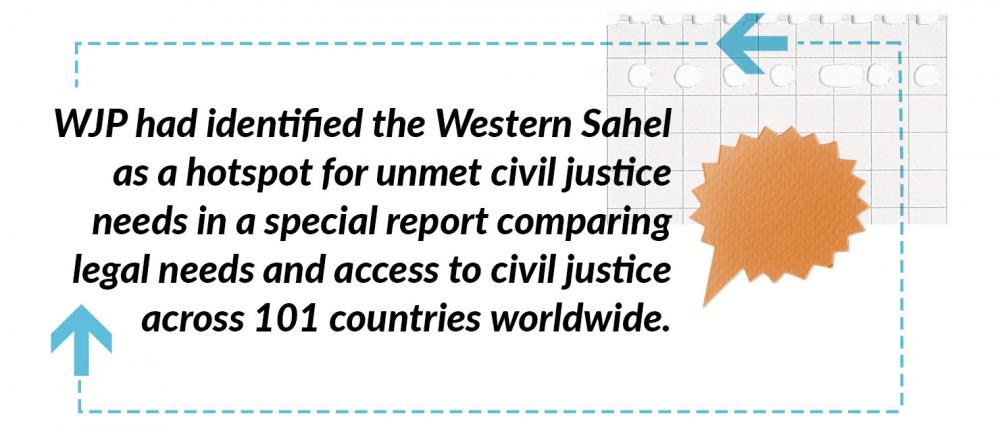
Not since the AIDS epidemic has a disease so tested the fragile threads of our global system. After Smallpox was eradicated in the mid-twentieth century, diseases with terrifying names and shocking rates of mortality — Ebola, Marburg, Measles, Nipah — were largely confined to the global South. Then, as COVID-19 quickly began to overwhelm health systems in Europe and the United States, it became clear that even the wealthiest nations were vulnerable to a global pandemic.
Of course, it really was not so hard to imagine our present contagion in advance. Virologists have been warning about a flu-like pandemic for decades. Yet the fault-lines of state failure remained largely invisible in Washington and Brussels. In the world's richest cities, a generation came of age accustomed to virtual entertainment and just-in-time commerce: for us, the prospect of mass unemployment and faltering supply chains seemed unthinkably remote and abstract. The fragility of our global systems lay concealed, like a weakness in the lungs, awaiting a moment of debilitation to emerge.
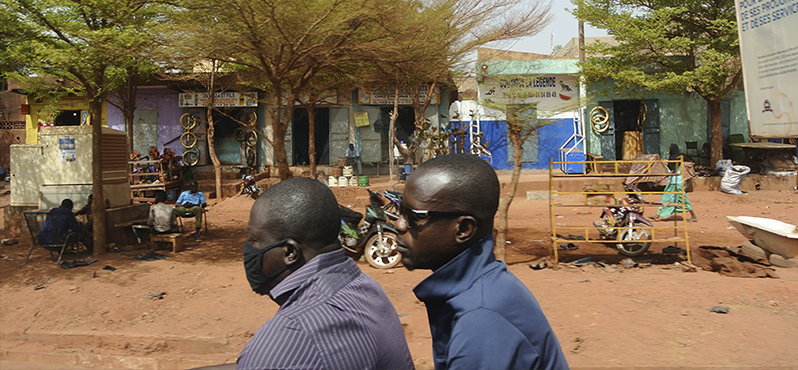
In development parlance, the concept of fragility denotes poor infrastructure, crippling debt, stifled growth, and a lack of human investment: conditions to which no country is immune. In development practice, however, fragility also evokes countries where conflict already festers, corroding the state's capacity to govern. It applies to Mali and Nigeria, where Al Qaeda and Boko Haram, respectively, pose a significant challenge to the state. Its paradigm is Somalia or the Sudan, where violence, famine, disease, and enslavement have beset the victims of war. In the global North, we grew accustomed to such ailments (like the literal diseases to which they are often compared) ravaging communities where government is weak, rule of law is anemic, and access to justice is dependent on wealth or status.
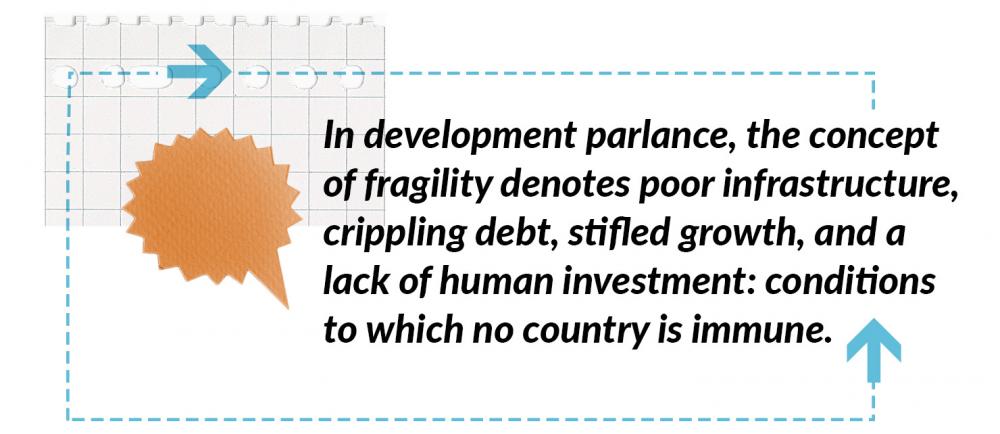
Then, in early March, fear of contagion led the World Bank, headquartered in the prosperous North, to cancel its annual Fragility Forum. The symbolism of this decision could not have been more poignant. Suddenly, hundreds of well-heeled development professionals were scrambling to rebook flights and cancel hotels. Within hours, a cascade of postponements began flooding my inbox. Like many organizations, the World Justice Project was compelled to move its public events online, including the release of its annual flagship WJP Rule of Law Index; days later, with the rest of North America, our office went entirely remote. The specter of genuine fragility, the thing in itself, had arrived in Washington, D.C.
By then, however, my bags had been packed, masks tucked carefully between Malaria pills and a certificate of vaccination for Yellow Fever, and I was en route to Africa. As my plane lifted off the Dulles tarmac, I thought of the challenges I would be facing and the fragility I was leaving behind.
1 In Mali, for example, subnational groups such as Platforme and the Coalition des Mouvements de l'Azawad (CMA) have taken up arms in order to resolve longstanding grievances with postcolonial governments whom they consider, with some historic justification, to be illegitimate. For a geographic overview of the armed groups operating in the Sahel, see the European Council on Foreign Relation's "Mapping Armed Groups in Mali and the Sahel."
2 Nigeria is Africa's largest economy, but it underperforms on absence of corruption as well as order and security. Niger has traded order and security for open government. A nominal democracy, Mali nevertheless scores well below the regional average for criminal justice and absence of corruption. Mauritania performs well on order and security, but this has come at the expense of every other factor comprising the rule of law, especially open government, regulatory enforcement, and criminal justice. Meanwhile, Cameroon ranks among the worst performers for overall rule of law: among sub-Saharan African countries, only the Democratic Republic of Congo fared worse.
Support for "Access to Civil Justice in the Sahel" has been provided by the Knowledge Management Fund, a program of the Knowledge Platform Security & the Rule of Law at the Clingendael Institute for International Relations, Netherlands.
